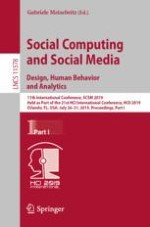2019 | OriginalPaper | Buchkapitel
From Social Media to Expert Reports: The Impact of Source Selection on Automatically Validating Complex Conceptual Models of Obesity
verfasst von : Mannila Sandhu, Philippe J. Giabbanelli, Vijay K. Mago
Erschienen in: Social Computing and Social Media. Design, Human Behavior and Analytics
Aktivieren Sie unsere intelligente Suche, um passende Fachinhalte oder Patente zu finden.
Wählen Sie Textabschnitte aus um mit Künstlicher Intelligenz passenden Patente zu finden. powered by
Markieren Sie Textabschnitte, um KI-gestützt weitere passende Inhalte zu finden. powered by
